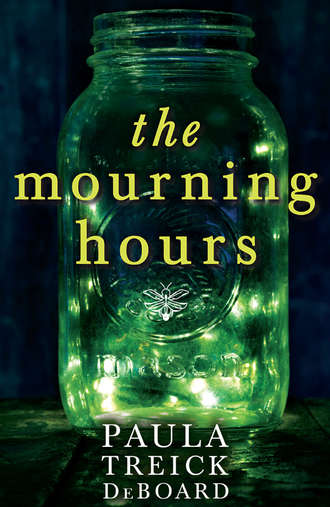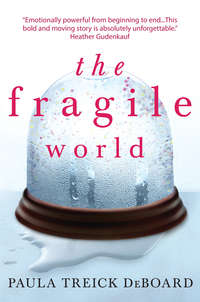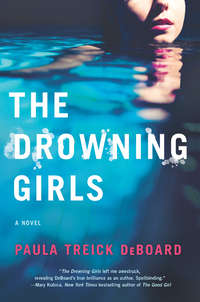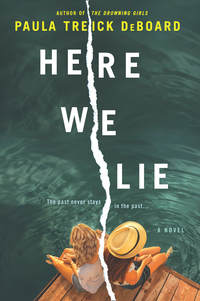
Полная версия
The Mourning Hours
Besides, I wasn’t exactly sure how to describe what had happened. The sex wasn’t even the bad part, not really. There was sex in just about every movie on TV, even though Mom cleared her throat pointedly and Dad changed the channel before anything got too detailed. Sure, Pastor Ziegler said every single Sunday that “sexual impurity” was explicitly forbidden by God, but the act itself didn’t seem that strange. My parents had done it, and their parents before them, and even, presumably, Pastor Ziegler and his wife. It didn’t seem all that crazy that Johnny and Stacy would give it a try, too. No, what I kept replaying over and over in my mind was their argument afterward: Stacy refusing to leave, Johnny kicking his dresser, then gunning the engine of the Green Machine.
And of course, I couldn’t say anything to Johnny. I’m not sure what I would have said, even if I had dared, but the thing that kept coming to my mind was that I was sorry. Maybe I shouldn’t have talked to Stacy that day under the bleachers. I shouldn’t have given her message to Johnny. I shouldn’t have encouraged her. Up until that afternoon, I’d been obsessed with Stacy myself. Now she scared me—she was too intense, too demanding. The further things went between Stacy and Johnny, the worse things got at home with Mom, the more I felt the heat of guilt creeping up my skin and sinking low in my stomach.
But if Johnny had been bothered by Stacy that day, he quickly forgot it. That very weekend, they went to a concert with friends in Green Bay. The next week she came over for dinner, and they held hands underneath the table. Their kisses, with her back pressed against the Camaro, were just as passionate as they had been before.
By mid-October, Johnny’s mind was more or less occupied with wrestling, anyway. His schedule was packed with predawn runs, after-school practices and weekend scrimmages. Mom and Dad agreed that this would be a good distraction for him, and things seemed to be settling down. There had been no more notes in the wash—either Stacy had stopped writing them or Johnny had become better at hiding them, and after a while, Mom started to soften toward Stacy, encouraging Johnny to invite her over on weeknights to study. “Better to keep them under our noses,” she’d say to Dad.
Stacy stopped by now and then in the evenings that fall, when Johnny was newly showered from practice, wet hairs still curling on his neck. She and Johnny “studied” in the kitchen, their feet entwined beneath the table, while Mom banged dishes noisily in the sink. They “studied” on the living room couch, textbooks balanced on their knees, Stacy’s head fitting perfectly into the crook of Johnny’s neck, while Dad snoozed in his recliner. Watching them, it seemed to me that they were drawn together like barbed wire to cow magnets.
I kept a close eye on Stacy at all times, half in love with her, half scared of what she might do. Sometimes it felt as if I’d imagined the whole scene in Johnny’s bedroom, the bedsprings squeaking, her protests that she wasn’t going to leave.... Sitting on the couch next to Johnny, she seemed as sweet and harmless as a slice of apple pie.
I couldn’t help watching her stomach, too—to see if it began to pooch out the way it happened with the married women at church. First it was a rounded blip, then a tight waistline, and before you knew it we were gathered in the church basement among streams of blue or pink crepe paper, discussing stretch marks and twenty-hour labors.
If it happened to those women at church, it could happen to Stacy Lemke, too. I spied on her whenever I got a chance, peeking at her stomach around the edges of my history textbook. I tried to imagine slender Stacy with her belly button protruding, her hands gripping the sides of her stomach, lowering herself carefully to sit. And what would Johnny be like as a father? Proud? Embarrassed?
It was funny because this—or something like this—was what I’d wanted last summer, when my heart had done a lopsided somersault every time I’d bumped into Stacy Lemke in town. I’d wanted Stacy for Johnny so that I could have a bit of Stacy for myself. But somehow, I thought, it had all gone wrong.
“Let me braid your hair, Kirsten,” Stacy coaxed on one of those fall evenings.
I considered, then shook my head slowly.
“Aw, come on,” Stacy said, reaching for me playfully.
“I don’t know.”
She reached for me anyway, her hands gathering a mess of hair at the back of my neck. Last summer I would have loved this. I would have melted into a puddle at her touch. Now I remembered the way she and Johnny had laughed at me, and I pulled back. “I don’t want to.”
Stacy sank back into the couch, frowning, her arms folded across her chest.
Johnny sighed. “Don’t you have some homework to do, pip-squeak? Something upstairs?”
I slipped off the couch and plodded to my room, where Emilie was engrossed in this month’s Seventeen. The cover read, “Thirteen Ways to Wear this Skirt.” How could there be thirteen ways to wear a skirt? I could only think of one.
“Do you think Johnny and Stacy will get married in our church or her church?” I asked.
Emilie gave me a look of disgust and went back to her magazine. “They’re not getting married, dummy,” she said. “They’re just dating, that’s all.”
“But if they really love each other—”
Emilie dog-eared a page of the magazine and set it aside. “Let’s put it this way. If they get married, it’s because she’s pregnant. If she gets pregnant, her parents will kill Johnny, then her. So there won’t even be a wedding to worry about. Capisce?” That was her new word, picked up from TV.
I sighed. “Capisce.”
Even after careful watching, I really couldn’t tell if there was a difference in Stacy. Johnny, on the other hand, had become suddenly gaunt. He had gone on the wrestler’s diet like he did every fall, shedding the weight he’d gained during the spring and summer. It wasn’t unusual for Johnny to hit 190 pounds in the off-season, although he wrestled in the 160s. In the past, he’d eaten egg-white shakes for breakfast, ran laps around the barn, jumped rope, sprinted up the bleachers, lifted weights in the gym. Sweated, then sweated some more.
But this year, he’d lost much of the weight without even trying. I didn’t notice it when he was bundled up in sweatshirts and warm-up pants, but when he sat across from us at the kitchen table in just a T-shirt, his arms looked positively scrawny, his chest sunken. Any sign of a bulge on his stomach—Aunt Julia’s lingonberry kuchen, Mom’s beef brisket—had completely disappeared.
“Are you trying to drop another weight class or something?” Dad asked one night when Johnny refused a second helping of Mom’s turkey tetrazzini.
Johnny shrugged. “I ate something before practice.”
Dad sat back in his chair, studying Johnny carefully. “Does Coach want you to drop more weight?”
Johnny looked back at him. “I’m not dropping weight.”
“Sure looks like you are.”
Johnny shrugged again. He brought a spoonful to his mouth slowly, as if in rebuttal. “Well, I’m not trying to.”
“But you are,” Mom said pointedly. “Are you feeling sick?” She reached across the table for his forehead, but withdrew her hand when he pulled back.
“I’m fine,” Johnny insisted. “You’re making too big a deal out of this.”
Later that evening, Dad called Coach Zajac, and Coach recommended less running and more weight lifting, more carbohydrates and fewer vegetables. “Coach says we’ll get him back on track,” Dad said, hanging up the phone. “Although he might not be a bad wrestler in the 150s, if it came to that.”
Mom pursed her lips together, shaking her head. “You two wouldn’t care if Johnny was a skeleton, so long as it gave him an advantage.”
When I dreamed that night, it was of Johnny on the mats, a skin-and-bones cadaver performing some strange, macabre dance. In the stands, Stacy was watching him, her hands folded beneath her belly.
eleven
Winter, which had only been flirting with us up to that point, made a serious appearance in the weeks between Thanksgiving and Christmas. Overnight, everything green disappeared beneath thick white snowdrifts. Mom dragged the boxes of our heaviest winter sweaters down from the attic, and we began listening to the local news each morning, praying for a snow day. It was so cold that Kennel was allowed inside the barn, where he terrorized our farm cats, essentially treeing them in the hayloft. One Saturday, Dad and Jerry cut down a fir from the woods behind our property and lugged it inside our house, then left it to Emilie and me to decorate with looping strings of tinsel and uneven rows of blinking lights. Mom brought down boxes from the attic, and we dug out our favorite ornaments—the clothespin reindeer Grandma Hammarstrom had made for us when we were little, the palm-print casts from our years in kindergarten, Johnny’s palm then as big as mine now. I ate almost as much popcorn as I strung.
We hosted Christmas dinner, complete with too-dry turkey and Mom’s creamy green bean casserole. Uncle Paul and Aunt Julia were there, as well as our cousin, Brent, and his fiancée, and a few of Mom’s cousins from northern Wisconsin. Jerry joined us, helping to cut the turkey with slow, precise strokes. “This man knows his way around a bird,” Dad had announced, clapping Jerry on the shoulder. With an apron tied around her neck and pot holders for hands, Mom was in her element. Grandpa gave horse rides on his knee to the toddlers, and Stacy stopped by, too, after the Lemkes’ family meal. Through it all, Johnny picked at his food like a fussy toddler.
It snowed every day of our Christmas break, and once the excitement of our presents had worn off, Emilie and I were mostly cooped up. She practiced the clarinet for hours on end, until even Dad requested that John Philip Sousa be confined to the basement, please. A friend rescued Emilie for a day of shopping in Milwaukee, and Mom took me ice-skating at the indoor rink in Waukesha with Katie and Kari Schultz and a few other girls from school, but otherwise, the weeks passed in a blue chill of boredom. Even as we watched TV or read books or played marathon games of double solitaire, it seemed our whole family was holding its breath for Johnny.
We didn’t miss a meet that season. Piled into the Caprice, we followed the Ships’ bus to tournaments in Kiel and Fond du Lac and Menomonee Falls, then spent entire Saturdays in the bleachers waiting for Johnny to wrestle, standing every so often to stretch our backs or relieve our behinds. Even Grandpa came along, although he complained that the car ride was too long and we sat in the bleachers too long and it took too long to make it all the way through the brackets.
Stacy was at every tournament, too. During the long lulls between Johnny’s matches, she sat in a corner of the gymnasium with the other kids from Lincoln High. The girls took turns braiding each other’s hair or passing around homework to be copied; they snapped gum and sucked lollipops and leaned close, heads together, for a whispered conversation that ended in a bout of hysterical laughter. Stacy carried a thick binder that was completely covered with doodles. Stacy and Johnny. I love Johnny H. Stacy Lynne Hammarstrom. It made me feel funny, to see her trying on our name for size.
She always crossed the bleachers to say hello to us, to chat about how Johnny was doing or how Johnny was feeling or who Johnny was up against. She had become a wrestling expert overnight. “See that one there, in the green sweatshirt? That’s Crowley, he’s in the 160s, too. That’s Johnny’s toughest opponent of the day,” she would say, bent into our airspace. From her necklace dangled the gold heart locket that Johnny had bought her for Christmas, with the money he’d saved from doing his chores and other odd jobs around our farm.
Конец ознакомительного фрагмента.
Текст предоставлен ООО «ЛитРес».
Прочитайте эту книгу целиком, купив полную легальную версию на ЛитРес.
Безопасно оплатить книгу можно банковской картой Visa, MasterCard, Maestro, со счета мобильного телефона, с платежного терминала, в салоне МТС или Связной, через PayPal, WebMoney, Яндекс.Деньги, QIWI Кошелек, бонусными картами или другим удобным Вам способом.





